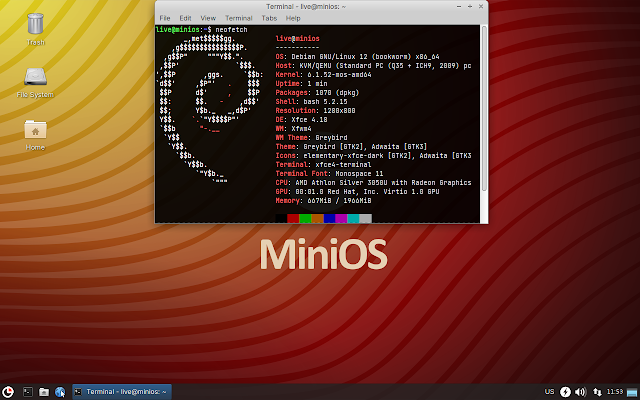MiniOS: A Compact Powerhouse Based on Debian
MiniOS: A Compact Powerhouse Based on Debian
Introduction
MiniOS is a Linux distribution that was initially launched in 2009 as a system designed for USB drives, based on Mandriva Linux. However, the project was suspended in 2013 and later re-emerged with a new focus, now based on Debian[2]. Debian is a free operating system that uses the Linux kernel, which is known for its stability and high level of security[6].
Origin and History
The MiniOS project has been around for over a decade, evolving in various forms. It was initially designed to be a lightweight Linux distribution for USB drives, based on Mandriva Linux. However, the project was suspended in 2013 and later re-emerged, now based on Debian[2]. The current release is now based on Debian 12 "Bookworm"[1][4].
Editions and Team
MiniOS offers a variety of editions in different sizes, providing a portable, desktop flavor of Debian that can be quite minimal or fairly robust[4]. The team at MiniOS has a remarkable set of technical capabilities that become available to commercial license holders, with decades of software-defined storage experience[5].
Unique Features
MiniOS is designed to be fast, simple, and reliable. It provides a live desktop distribution that can be quite minimal or fairly robust, depending on the user's needs. It's also portable, making it an excellent choice for users who need a lightweight, flexible operating system that they can carry on a USB drive[2][4].
Installation Tips and System Requirements
For optimal performance, MiniOS recommends a minimum of 128GB of memory per node and a minimum of 4 host servers per distributed deployment. It also recommends using the same type of drive (NVMe, SSD, or HDD) with the same capacity across all nodes in the deployment[3].
Troubleshooting Tips
While MiniOS is designed to be user-friendly, some users have reported difficulties with booting the system on certain hardware. If you encounter this issue, trying MiniOS in a virtual machine may provide a smoother experience[4].
Disclaimer
This article is provided by The Distrowrite Project for informational purposes only. While we strive to keep the information up-to-date and correct, we make no representations or warranties of any kind, express or implied, about the completeness, accuracy, reliability, suitability, or availability with respect to the MiniOS website or the information, products, services, or related graphics contained on the website for any purpose. Any reliance you place on such information is therefore strictly at your own risk.
Citations
[1] A weekly opinion column and a summary of events from the distribution world - DistroWatch.com: Put the fun back into computing. Use Linux, BSD. https://distrowatch.com/weekly-mobile.php?issue=20230821
[2] MiniOS - Fast. Simple. Reliable. https://minios.dev
[3] Hardware Checklist — MinIO Object Storage for Windows https://min.io/docs/minio/windows/operations/checklists/hardware.html
[4] Review: MiniOS 20230606 - Tux Machines http://news.tuxmachines.org/n/2023/08/21/Review_MiniOS_20230606.shtml
[5] SUBNET Subscription & MinIO Pricing https://min.io/pricing
Minimal - YouTube https://youtube.com/watch?v=-Y0ui9X4eLA
[6] Linux distribution - Wikipedia https://en.wikipedia.org/wiki/Linux_distribution



Comments
Post a Comment
Hello and welcome to The Distrowrite Project! We appreciate your engagement and value diverse perspectives. Our community thrives on respectful and constructive discussions. Please ensure your comments align with our guidelines: no hate speech, personal attacks, or spam. Let us foster a positive environment where everyone feels comfortable to share their thoughts and insights. Kindly direct any complaints and suggestions for any software/hardware directly, clearly and politely to the respective developer(s). Thank you for being a part of our community!